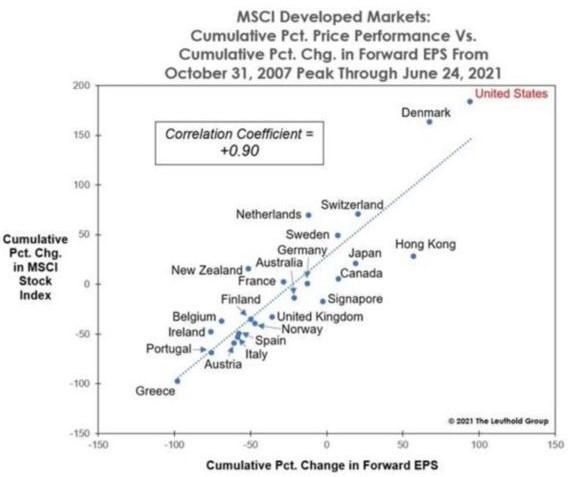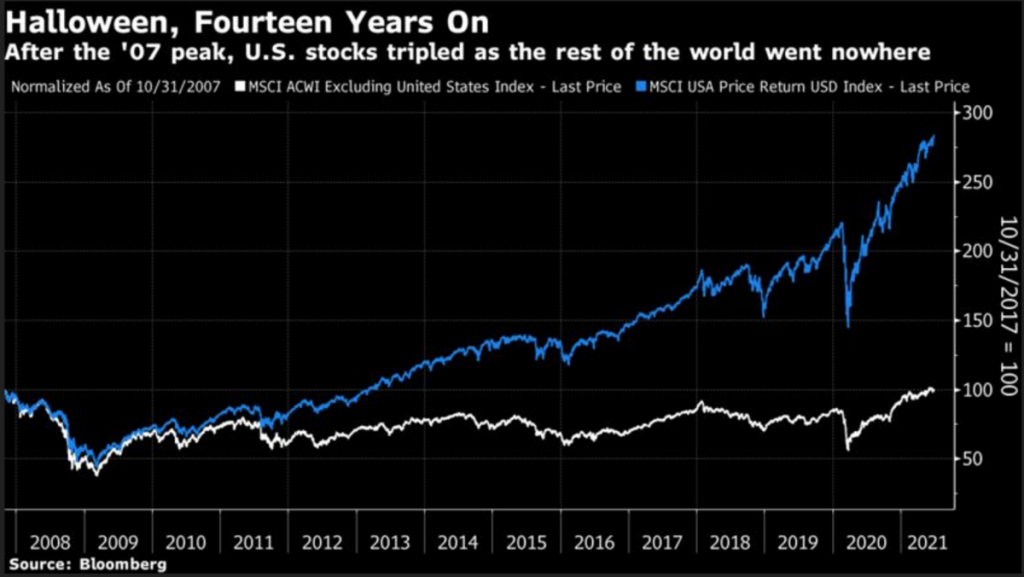Global Market News
Global equities have mixed week
Global equities had a volatile week as US bond yields unexpectedly dropped. The S&P 500 and Dow Jones barely edged up 0.40% and 0.24% respectively. The Nasdaq also made slight gains, closing 0.43% up on the week. The yield on the US 10-year Treasury plummeted several basis points to 1.36% and the price of a barrel of West Texas Intermediate crude oil rose 6.65% to $74.61 after a fallout between OPEC+ members over an oil production deal. Volatility, as measured by the CBOE Volatility Index, increased slightly to 16.
Treasury yields slump
Yields on US Treasury notes slumped this week, dropping nearly 7 basis points over the week and 13 basis points over the last month. Economists are offering various reasons for the plunge. Some point to increasing concerns over the spread of the coronavirus Delta variant while others cite signs that global growth and inflation may have peaked. Lower yields may imply that recent economic growth was transitory, signaling that the global economic recovery is not going as smoothly as hoped. While most analysts focus on the explanations listed above, we choose to differ and simply believe that yields have dropped because the Federal Reserve has flooded the markets with liquidity; all reserves are considered excess reserves (since the pandemic hit in March 2020) and that excess liquidity is channeled into Treasuries.
Coronavirus Updates
Covid-19 by the numbers
Global Confirmed Covid-19 cases: 185,000,000 Global Covid-19 deaths: 4,000,000
US Confirmed Covid-19 cases: 33,800,000 US Covid-19 deaths: 606,000
*As of Friday evening
Spread of the Delta variant causes concern
The spread of the Covid-19 strain named the Delta variant is causing concerns of a new wave of the virus in many regions of the world. This week, the pandemic’s death toll hit 4 million as the surge in new variants that spread quickly, and in some cases lead to more hospitalizations, threatens the progress of vaccines, which in many regions, like Sub-Saharan Africa and Central America, are not widely available. Concerns over the rapid spread of the Delta variant have prompted new studies into the effectiveness of vaccines as well as booster shots. To better protect against the Delta strain, Pfizer and BioNTech are seeking clearance to distribute a booster shot in the US. The Delta variant now accounts for more than 50% of new infections in the US.
International Developments
Haitian president assassinated
Very early Wednesday morning, Haitian President Jovenel Moise was assassinated and his wife shot in their home. The attack comes amid political unrest in the country which has escalated due to gang violence and large protests against Moise’s government. Haitian authorities say the assassination involved a group of more than two dozen foreign mercenaries, including 26 Colombians and two Americans of Haitian descent. Haitian officials say they have asked for the assistance of US forces to stabilize the country.
Tokyo declares state of emergency through Olympics
In response to an increase in Covid-19 cases in Japan, Japanese Prime Minister Yoshihide Suga announced that Tokyo will be placed under a state of emergency for the duration of the Olympic games. This week, Tokyo reported its highest daily total of new infections since May and 30% of those are the Delta strain Olympic organizers have since announced that spectators will be prohibited from attending the events at Tokyo venues, but the games will proceed.
US Social & Political Developments
Biden moves Afghanistan troop withdrawal forward
In a formal statement regarding the US troop withdrawal from Afghanistan, President Joe Biden said the drawdown will be completed by August 31st instead of September 11th. The move has received a good deal of public support from Americans as Biden has assured that the US troop presence in Afghanistan fulfilled its antiterrorism objectives years ago and that the country’s resources could be better used elsewhere. During the withdrawal, Taliban forces have escalated their offensives throughout Afghanistan, even claiming a key border crossing with Iran this week. However, also this week, delegations from the Afghan government and Taliban signed a joint declaration pledging to continue peace talks.
Pentagon cancels contract with Microsoft
The Pentagon has canceled a $10 billion cloud-computing contract it had awarded to Microsoft. The contract had caused a lot of controversy as Amazon alleged that it was not awarded the contract due to the Trump administration’s bias against Amazon CEO Jeff Bezos. However, the Pentagon says the contract was canceled because they have chosen not to move forward with its Joint Enterprise Defense Infrastructure program due to evolving industry requirements. It will be accepting new proposals from cloud service providers, including Microsoft and Amazon, which could potentially lead to another battle between the two tech giants.
Corporate/Sector News
Biden signs executive order to bolster competition
This week, President Joe Biden signed an executive order to address the increase in consolidation the US has seen over the last two decades. The presidential directive targets the large companies that have been buying up smaller companies, stifling competition and innovation across the US economy. The Biden administration says declining competition is to blame for the rise in prices of necessities, like prescription drugs, and lower wages for workers. More specifically, the order will introduce new rules for bank mergers, drug prices, and airline fees, among other new guidelines.
DiDi Global’s IPO disappoints amid Chinese tech crackdown
China is cracking down on tech companies, citing national security concerns. Recently, Beijing banned the ride-sharing company Didi Chuxing (DIDI) from Chinese app stores and put it under a national security review following its listing on the New York Stock Exchange (NYSE). The crackdown sent the stock plummeting more than 20% just a few days after the company went public. The crisis has quickly spread to other US-listed Chinese companies including online recruitment company Boss Zhipin and truck-hailing apps Yunmanman and Huochebang which are also under investigation by the Chinese government.
OPEC+ production deal falls out
Oil prices soared this week after global oil production talks between OPEC+ members collapsed. Negotiations fell through last minute amid a disagreement between Saudi Arabia and the United Arab Emirates (UAE) on how the UAE would calculate its production quota. Last year, at the onset of the pandemic, OPEC+ decided to cut production to control global oil prices. The group was set to reach a deal to increase oil production as the global economy shows signs of recovery from the pandemic. Russia is now leading efforts to mediate the dispute between Saudi Arabia and the UAE so that a deal to raise oil output can be made as soon as possible.
Recommended Reads
Ethiopians deserve a future they can be proud of
Index of U.S.-Listed Chinese Companies Falls to Lowest Point in Over a Year
Platform economy: Why China wants to tame its new business dragons
U.A.E. Pushes to Produce More Crude, Creating OPEC Deadlock
U.S. Treasury Yields Extend Steep Decline
Europe’s Economy Is Rebounding. Here’s How to Play It.
The Iran Nuclear Deal Isn’t the Problem. Iran Is.
The Build Back Better World Partnership Could Finally Break the Belt and Road
This week from BlackSummit
Crossroads: At the Intersection of Geopolitics and Geoeconomics – Rachel Poole
Geopolitical Challenges and Statecraft – Rachel Poole & Tyler Thompson
Images of the Week


Video of the Week
Richard Branson and Jeff Bezos Are Going to Space. Here’s How Their Trips Will Differ.
Source: Wall Street Journal
